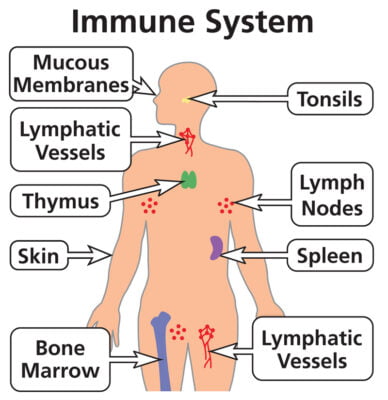When the number of illnesses and diseases rises, we become more caring about our body and how it works especially the immune system.
Everyone is born with innate (or natural) immunity, a type of general protection. Your immune system is a large network of organs, white blood cells, proteins (antibodies), and chemicals. This system works together to protect you from foreign invaders (bacteria, viruses, parasites, and fungi) that cause infection, illness, and disease.
How does the immune system work?
When the body senses foreign substances (called antigens), the immune system works to recognize the antigens and get rid of them. B lymphocytes are triggered to make antibodies (also called immunoglobulins). These proteins lock onto specific antigens. After they’re made, antibodies usually stay in our bodies in case we have to fight the same germ again. That’s why someone who gets sick with a disease, like chickenpox, usually won’t get sick from it again.
Humans have three types of immunity:
- Innate immunity: Everyone is born with innate (or natural) immunity, a type of general protection. For example, the skin acts as a barrier to block germs from entering the body. And the immune system recognizes when certain invaders are foreign and could be dangerous.
- Adaptive immunity: Adaptive (or active) immunity develops throughout our lives. We develop adaptive immunity when we’re exposed to diseases or when we’re immunized against them with vaccines.
- Passive immunity: Passive immunity is “borrowed” from another source and it lasts for a short time. For example, antibodies in a mother’s breast milk give a baby temporary immunity to diseases to which the mother has been exposed.
How to naturally boost the immune system:
Having a healthy lifestyle can help the body’s natural defenses and benefit overall health:
- not smoking
- exercising
- avoiding excess alcohol consumption, for those who drink
- washing the hands frequently
- managing stress well
- keeping up to date with recommended vaccines
- having a balanced diet with plenty of fruits and vegetables
- having a moderate weight
- getting at least 7 hours of sleep in every 24-hour period
Ways to boost your immune system:
- Take vaccines
- Maintain a healthy diet
- Exercise
- Hydrate
- Enough sleep
- Take supplement
Various vitamins and minerals often referred to as “micronutrients,” are necessary for a healthy immune system.
The main micronutrients that play a role in the immune response include:
- vitamin A
- vitamin C
- vitamin D
- vitamin E
- vitamin B6
- vitamin B12
- folate
- zinc
- iron
- copper
Ideally, we would all obtain optimal amounts of these micronutrients through a well-balanced diet — but this can be difficult to achieve and many people worldwide have nutrient deficiencies.
That’s why we recommend taking supplements as they will add more nutrients that your body needs and help boost your immune system. The supplement is beneficial to the immune system, as long as dosages stay below the recommended safety limits. High dosages can cause diarrhea, abdominal pain, and nausea.

